-
 How the heroines shine brightly?
How the heroines shine brightly?

● The heroines advanced to the group stage by beating Chinese Taipei 4-0 and Iran 7-0. In the guarter-finals,China scored three points in a row against Vietnam after conceding the first goal.
● In the semi-final match against the Japanese women's football team, the Chinese women's football team, which was at a disadvantage in both world rankings and strength, fell behind twice. However, the women's football girls never gave up and always maintained an optimistic attitude and tenacious willpower. The women's football girls equalized the score at the last minute of extra time and eliminated the Japanese women's football team through penalty kicks, and entered the Asian Cup final strongly.
● In the final with the South Korean women's football team, the Chinese women's football team staged an epic and shocking reversal after losing 2 points in a row, tying the score in 4 minutes, and lore the Korean women's football team at the last moment.
● This is also the first time the Chinese women's football team has won the Asian Cup since the "seven consecutive championships" 16 years ago.
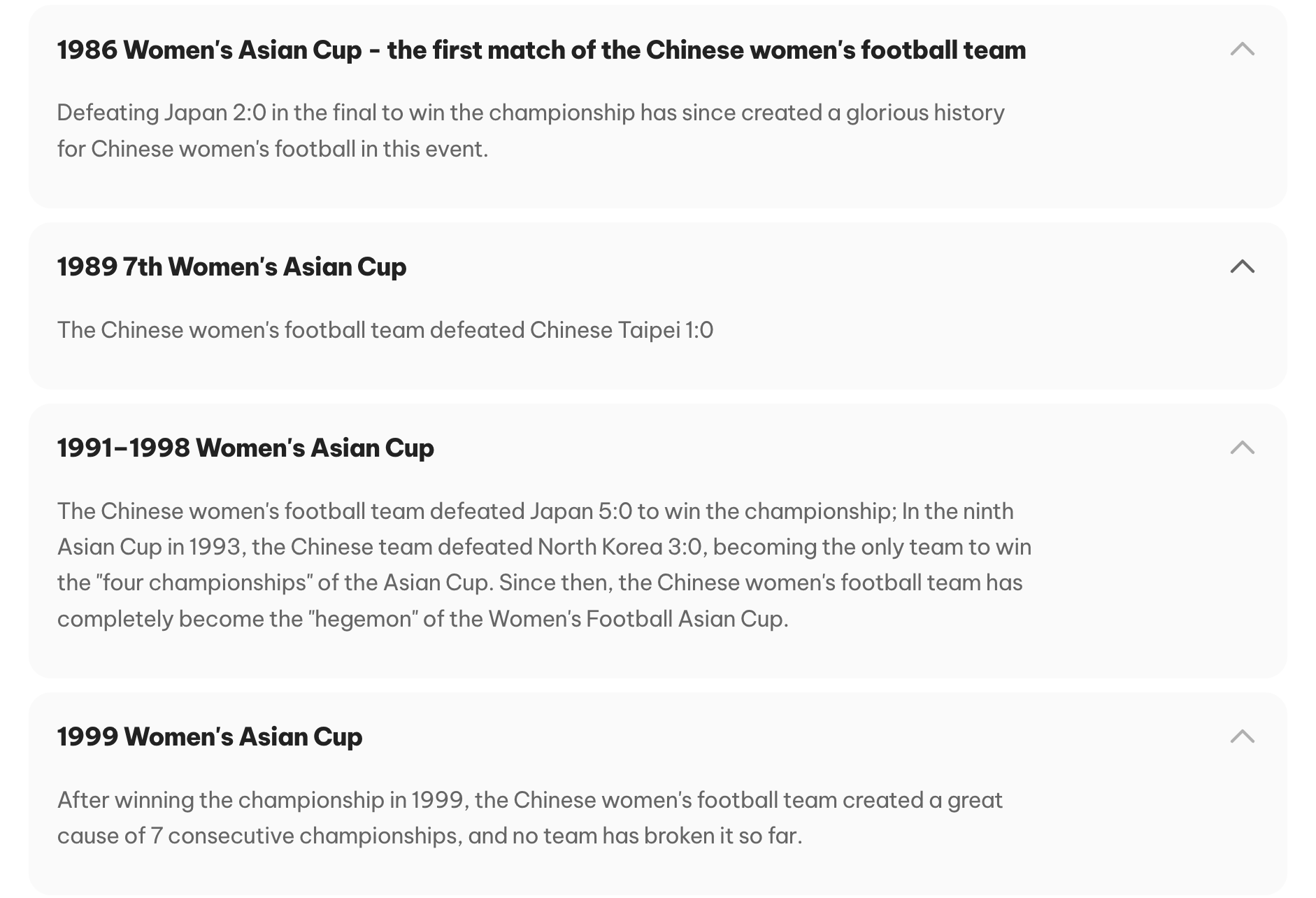
Pay tribute to the spirit of never giving up "Sounding Rose"!
World Cup rankings from 1991 to 2019 declined year by year
However, the Chinese women's soccer team has hit a low point since an 8-0 defeat to Germany in Athens. At the 2005 National Women's Football Conference and the 2008 Beijing Olympic Games Chinese Women's Football Team Preparation Conference, the Chinese Football Association admitted in its Analysis of the Development Situation of World Women's Football: "At present, Chinese women's football team has fallen to the bottom of the second group in the world, losing its leading edge." At the same time, the United States before 2000, Norway, China team three strong situation is no longer exist. At present, the pattern of women's football in the world has begun to evolve into a bipolar confrontation between the American teams represented by the United States and Brazil and the European teams represented by Germany, Norway and Sweden, and has formed a multi-polar development trend of rapid prosperity in Europe, steady development in North America, rapid rise in Africa and rapid development in Asia. Nowadays, the competitive level of women's football in the world is generally improved, and the gap between strength and weakness is gradually narrowed, which is mainly reflected in the increasingly close score, high speed, strong confrontation and other characteristics. What cost the women's team the top spot? How should the Chinese women's football team return to the top? This article uses multi-dimensional data analysis to bring you closer to the factors affecting the development of Chinese women's football.
What made women's football lose their place in the first group? How can Chinese women's football get back to the top? This article uses multi-dimensional data analysis to bring you closer to the factors that affect the development of Chinese women's football.

(The following table shows the repetition rate of players during the "seven consecutive championships" period)
It is not difficult to see from the data chart that the players who were close to 12 during the seven consecutive championships participated in at least two Asian Cup matches.
Outstanding women's football players Zhong Honglian, Shui Qingxia, Sun Qingmei, Wen Lirong, Liu Ailing, etc. participated in at least half of the competitions, spanning more than ten years.
It can be seen that there is a positive correlation between the excellent performance and the repeated playing rate of the excellent players in a certain proportion.
Therefore, it is necessary to optimize the reward mechanism for outstanding performers, increase the incentives, and improve the selection mechanism, which can further promote the overall strength of the women's football team.
In such a major international sports event, there are many new players in our team, according to Xinhua News Agency: "Various new faces appeared in the 22-man roster, 10 of whom have no more than three international competition experience, and 5 players. Not even the number of appearances for the adult national team." Such a lineup also made the audience wonder: "Is this going to use the Olympics to train troops?"
In addition, the Xinhua News Agency commentary also mentioned the problem of "putting the cart before the horse" in the thinking of the Olympic team building, and even criticized: "After all, the Olympic Games is not a training ground, it is the arena and competition arena for the strongest teams between countries and regions. It's a strong dialogue, not a rookie leveling up."
And it's enough to show that women's football has had a disorganized training and game plan for a long time.
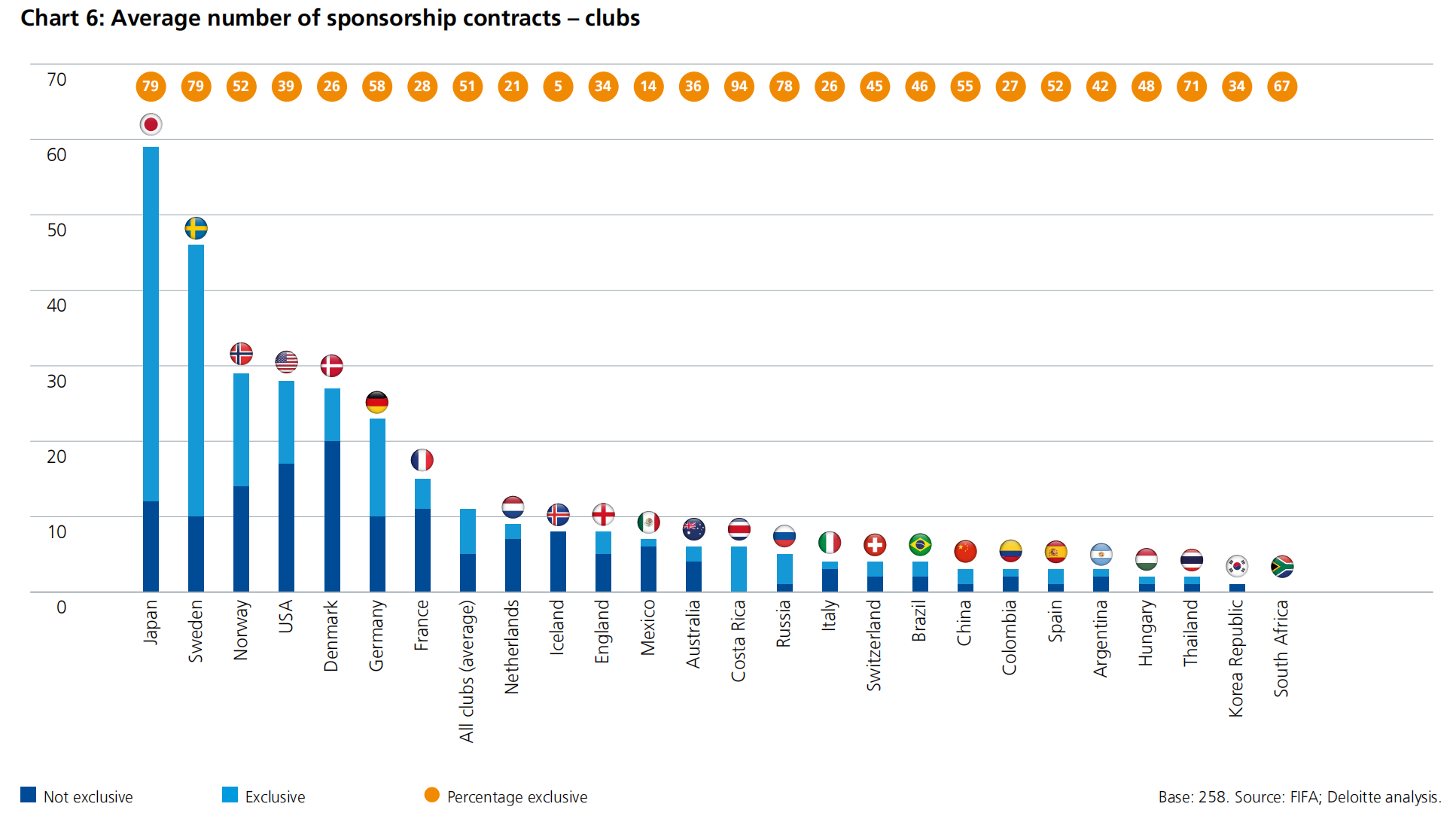
In women's football, only 13% 30) of clubs report revenues in excess of $1 million, according to a FIFA data survey.
Typically, clubs currently rely heavily on club revenue programs (eg, cross-funding and association subsidies from men's teams, averaging 39% per club).
The number of club sponsorship contracts in China can be said to be very small.
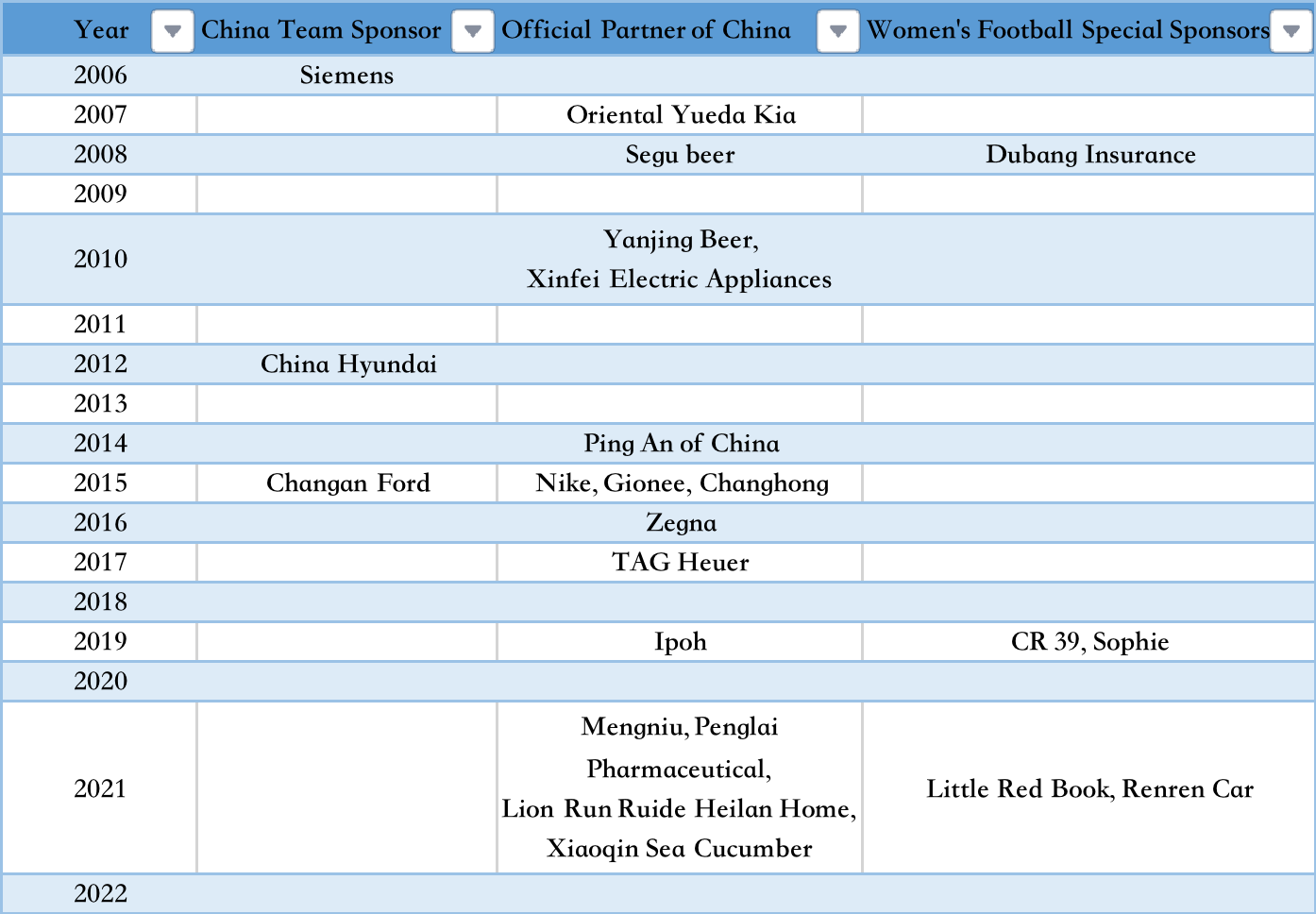
(The picture shows a list of sponsors of women's football in various competitions in recent years)
It is not difficult to see from the data on the proportion of dedicated sponsorships received by the Chinese women's football team that the market's recognition of the women's football team is still at the national team level.
And according to various news reports and statistics, it can be seen that the foundation of the national team-the Chinese Women's Football League has not yet been benefited.
Whether it is the Women's Super League or the Women's League, the participating teams are still basically in a situation of no sponsorship.
All the team's expenses are funded by the local sports bureau. The market value of the women's football team has not been explored or recognized. As a result, the current women's football team is funded by the men's football team, lacking its own market audience and lack of hematopoietic ability.
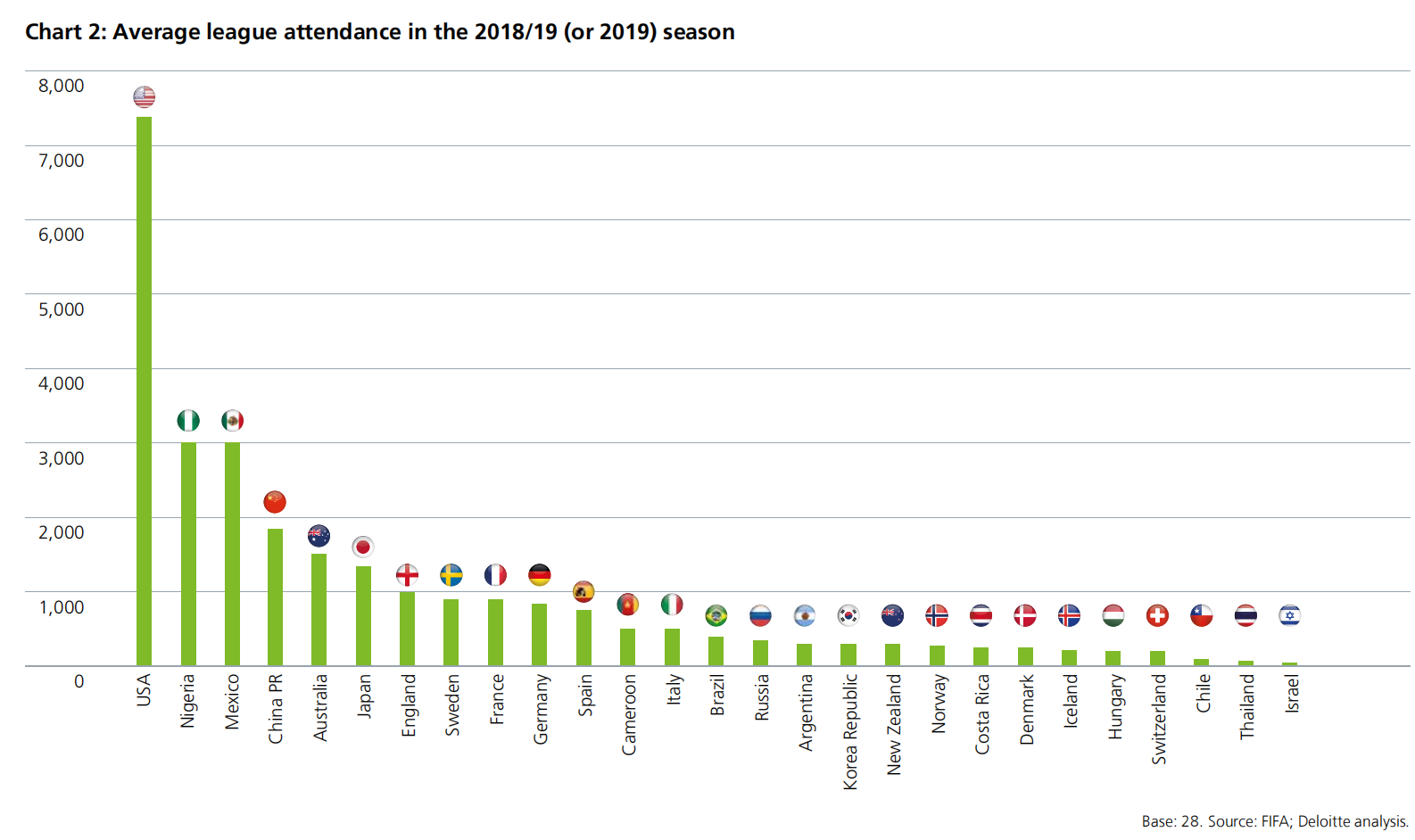
China Women's Super League 2019 average league attendance was only 1840
According to the data released by FIFA and the Chinese Football Association, the attendance rate of the Chinese Super League Women's Football League is far lower than that of the United States and Mexico, the major football countries, but it is higher than that of Japan and England due to population reasons.
Many games were attended by only a few hundred spectators, mostly relatives and friends of the players, while the average attendance in the men's soccer league over the same period was 23,985.
Our country has a population of 1.4 billion, but the combined total viewership of the entire Women's Football League matches is just over 2 million throughout the year. Therefore, after winning the AFC Champions League, the women's football coach Shui Qingxia was not blindly happy, but put forward a request to the fans, "regardless of whether the team succeeds or fails, I hope that the fans will not directly follow the trend because of a game or directly. Solai pays attention to the Chinese women's football team, and I hope everyone can give the Chinese team a stable support."
The stadium is not only about winning or losing, but also the spirit of never giving up and wanton swaying blood, peaks and valleys will appear at any time, I hope fans, friends and football lovers The audience can treat each game of the girls with a heart of support and tolerance.
The following picture shows the proportion of each club's investment in youth training and club construction
According to the youth training survey report of the Chinese Professional Football League, 49 Chinese Super League, Chinese League One and Chinese League Two clubs basically have their own echelons. Among them, Luneng, Greentown, SIPG, Evergrande and R&F all have standard four-level echelons. Even have 6 echelons already.
Only 20% of 49 clubs have real football teams
More than two-thirds of the club teams invested in youth training below the entry standard of 4 million
(Some pictures of the club's youth training, the pictures come from the Internet)
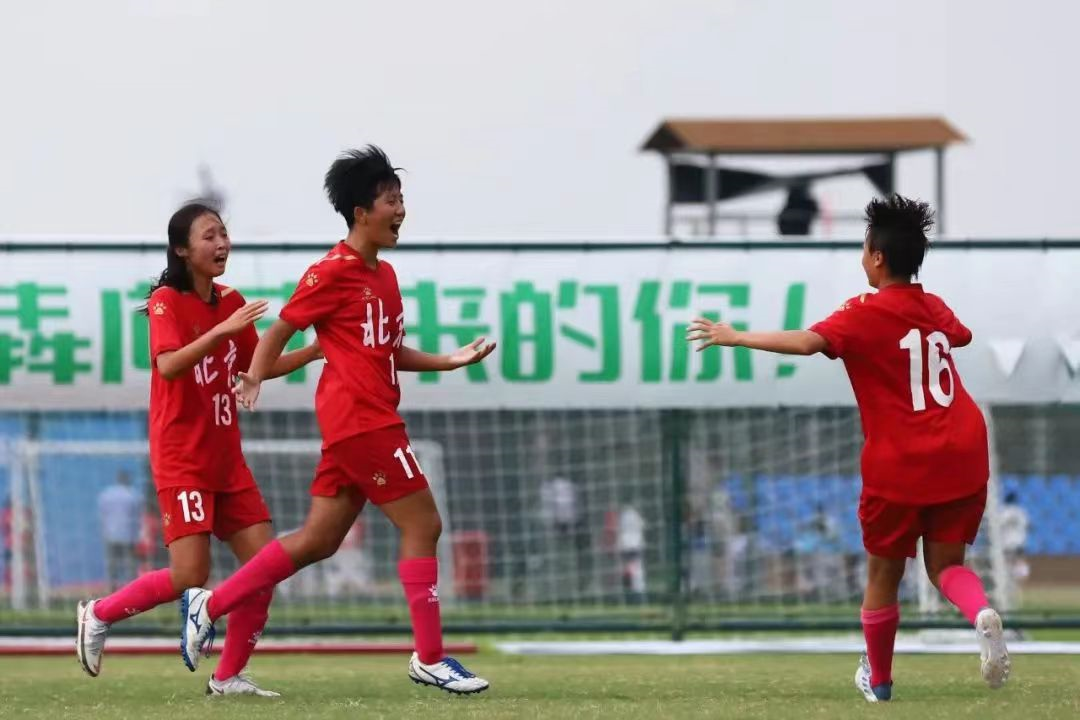
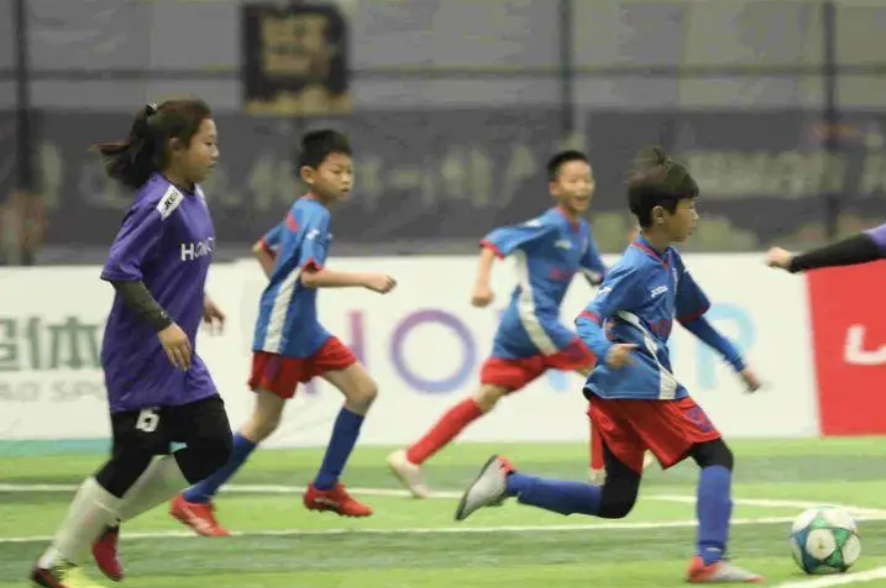
Taking December 31, 2021 as the standard time point, the General Administration of Sports organized the statistical survey of sports venues according to the "National Sports Ground Statistical Survey System" (Guo Tong Zi [2020] No. 41) approved by the National Bureau of Statistics. The number of stadiums classified by sport is shown in the figure below:
In our street survey, football pitches, one of the three major balls, not only have a small number of constructions, but also with the rise of entertainment projects such as square dancing and Frisbee in recent years, football pitches are often diverted for other purposes. But there is no clear law to regulate these situations, and the problem of occupied venues is also a headache for football fans.
The lack of football fields has also largely led to the "difficulty of playing football" for teenagers who are interested in football.
The following picture shows the histogram of the polar coordinate system of the players in each club's echelon.
For the training of echelon players, the outside world is more concerned about their tuition fees. Once some outstanding young players enter the official list of the club's echelon at all levels, generally no longer pay. The fee payment mainly occurs in the football school learning stage. Generally, students start learning at the age of 6-8, and the tuition fee ranges from 10,000 to 60,000 per year. Excellent players have appropriate reductions in fees. From the beginning of learning to the age of 19, it takes 9 years and costs an average of 9 years. At around 300,000, many reach 600,000 or more.
To train a player, parents spend at least 500,000 yuan, and 90% of families are overwhelmed.
The picture below shows the statistics of parents' opinions on the current situation of youth training.
In the data survey, it was found that many young players came from ordinary families in second-, third-, and fourth-tier cities. Many parents regarded football learning as an investment, with the sole purpose of playing in the league and becoming a star.
Therefore, once the child fails to embark on the professional football path, 96% of parents will feel that their previous investment has been lost. If you play in the professional league, 60% of the parents believe that the annual salary of the players should be no less than 600,000 yuan, 30% of the parents think that it should be no less than 300,000 yuan, and 10% of the parents think it should be more than 1 million yuan.
Because most parents want their children to become football stars, even if 90% of parents think that it is overwhelmed to support their children to play football, they still insist on gritting their teeth. In this regard, 93% of parents believe that the fees for domestic football youth training are too high, 70% of parents think that the ideal youth training fee is about 1,000 yuan per year, and 20% of parents think that tuition fees should be between 2,000-5,000 yuan.
Through the above data survey, it is found that although Chinese football has invested a lot in youth training, the success rate is not high, and supporting students has become a heavy burden for some families.
To this day, the shortcoming that really restricts China's youth training lies in the training mechanism, the level of coaches and the competition system.
First of all, it is necessary to strengthen the hardware construction such as venues and facilities, which requires capital investment to be guaranteed. As for the improvement of training concepts and methods, it is not always possible to rely on foreign coaches, but it is still necessary to start with the coaches studying abroad. The level of coaches has been improved, and the venues and facilities and hardware construction industry can keep up, and then establish a regular and standardized youth league system from the region to the whole country, so that the local sports bureaus in the "National Games and the Olympic Games" ignore for the sake of local achievements. The situation of the national team no longer occurs. It may be the real difficulty and the top priority to allow young players of every age group to have enough official games to play.

From the older generation of Chinese women's football
to today's young team
Clanging roses are inevitable
On the competitive pitch
Encountered a low point
But now, we can proudly say
The spirit of women's football never dissipates
The clanging rose is still beautiful
As Shui Qingxia said after the game
With the honor of winning the Asian Cup
Chinese women's football has found its way to the future
They don't think about the past, they don't fear the future
Step forward with firmness and calmness
in this
There is the persistence of the old coach
There is a legacy of teenagers
Clang rose
never wither